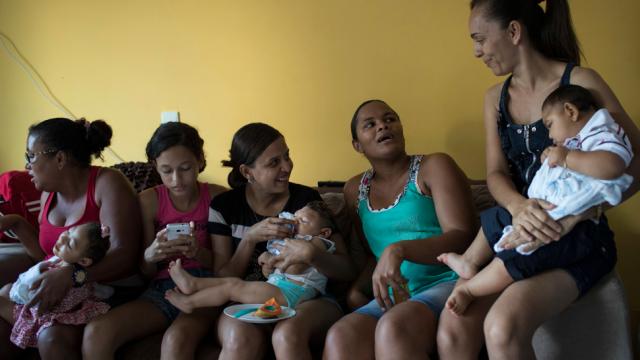Earlier today, the World Health Organisation declared that the Zika virus, along with its related neurological complications, no longer constitutes an international emergency. The announcement is a troubling development that could threaten important research, while also undermining those who are most affected, namely women, children and the poor.
Image: AP
Zika is no longer an international Public Health Emergency of International Concern (PHEIC), a designation assigned to the virus this past February. “We are not downgrading the importance of Zika,” noted Peter Salama, executive director of the WHO’s emergencies program, at a press conference held earlier today. “We are sending the message that Zika is here to stay and the WHO response is here to stay.” The health organisation said Zika and its “associated consequences” remain a serious health challenge requiring “intense action”, but not deserving of PHEIC status.
The WHO made its decision after an advisory committee concluded that Zika is just like any other dangerous mosquito-borne disease, such as malaria, yellow fever and chikungunya, so it doesn’t warrant special treatment. The ongoing Zika epidemic, claims the WHO, is no longer an exceptional situation.
Except that Zika is exceptional. It is qualitatively different than other diseases in several respects. It affects babies, and by consequence, their mothers. And because Zika is a tropical disease, it also affects populations in the developing world. Scientists still have much to learn about the virus, including how it spreads and whether the epidemic could become even worse. In a word, the WHO’s decision was premature.
Indeed, women are usually the ones who have to carry the burden of this dreaded virus, particularly in countries like Brazil where “machismo” culture still rules. In Brazil’s poor northeast, for example, where 80 per cent of cases were concentrated earlier this year, scores of women were abandoned by their partners. Many of these women are from low-income families; they can’t afford to go back to work while also taking care of a child with a severe developmental disorder and physical disabilities.
The other scary thing about Zika is that we still don’t know very much about it, including how it spreads and the unknown ways it affects the developing fetus and those who have been infected. And unlike other mosquito-borne diseases, Zika can be transmitted sexually. It’s not entirely clear what that means in the large scheme of things.
“Are we going to see a resurgence in Brazil, Colombia and elsewhere?” asked Dr Anthony S. Fauci, director of the National Institute for Allergy and Infectious Diseases, in a New York Times article. “If they pull back on the emergency, they’d better be able to reinstate it. Why not wait a couple of months to see what happens?”
Like Fauci, other scientists are worried about the WHO’s decision to downgrade Zika, and the potential implications to ongoing scientific research. Some observers worry that this complex and multifaceted epidemic will fall by the wayside when it comes to research funding. There’s also concern that Zika will spread elsewhere in the world, catching the scientific community and health officials off guard.
“The international response to Zika has been lethargic, and if WHO called off the global emergency, it would provide reason for governments and donors to pull back even more,” said Dr Lawrence Gostin, an international health law expert at Georgetown University, in a recent STAT post. “That would be a recipe for the very lack of preparedness the world has seen time and again with infectious diseases.”
Hopefully none of these fears will come to pass, and Zika will remain a top priority for scientists and health officials. Otherwise, the world could quickly forget about a disease that’s afflicting some of the world’s most vulnerable populations.
